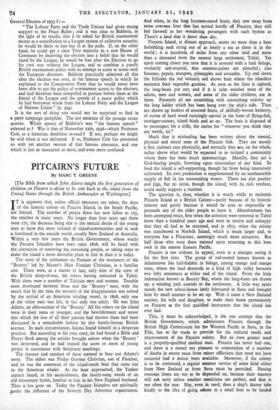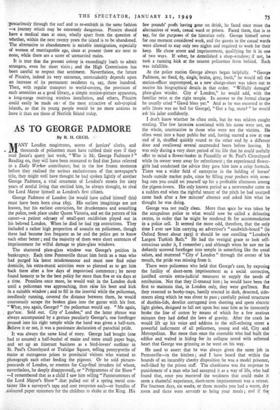PITCAIRN'S FUTURE •
By MARC T. GREENE [The Bible from which John Adams taught the first generation of children on Pitcairn is about to be sent back to the island from the United States through the British Ambassador at Washington.]
IT is apparent that, unless official measures are taken, the days of the historic colony on Pitcairn Island, in the South Pacific, are limited. The number of people there has now fallen to 125, the smallest in many years. No longer than four years ago there were 17o, the decrease being due to the natural desire of the young men to leave this most isolated of island-communities and to seek a livelihood in the outside world, usually New Zealand or Australia. Within a very few years the British. Government, whose wards the Pitcairn Islanders have been since 18o8, will be faced with the alternative of removing the remaining people, or taking steps to make the island a more desirable place to live in than it is today.
The story of the settlement on Pitcairn of the mutineers of the `Bounty,' led by Master's Mate Fletcher Christian, is a familiar one. There were, as a matter of fact, only nine of the crew of the British sloop-of-war, the others having remained in Tahiti. With them were a number of Tahitian men and women. Trouble soon developed between these and the ' Bounty' men, with the result that by the time the mystery of the disappearance was solved by the arrival of an American whaling vessel, in 1808, only one of the white men was left, in fact only one adult. He was John Adams, an able-seaman of the 'Bounty.' All the others on the island were in their teens or younger, and the bewilderment and terror into which the loss of all their parents had thrown them had been dissipated in a remarkable fashion by this barely-literate British seaman. In such circumstances Adams found himself in a desperate position. But according to his own story, he had found a Bible and Prayer Book among the articles brought ashore when the `Bounty' was destroyed, and he had trained the score or more of young people in accordance with Scriptural teachings.
The manner and conduct of these seemed to bear out Adams's story. The oldest was Friday October Christian, son of Fletcher, and he was the steersman of the island-made boat that came out to the American whaler. As the boat approached, the Yankee captain heard, to his astonishment, the lustily-sung words of an old missionary hymn, familiar to him in his New England boyhood. Thus it has gone on. Today the Pitcairn Islanders are spiritually pricier the influence of the Seventh Day Adventist organisation. And when, in the long fourteen-oared boats, they row away from some overseas liner that has tarried briefly off Pitcairn, they still bid farewell to her wandering passengers with such hymns as There's a land that is fairer than day.
Pitcairn Island, at distant approach, seems no more than a bare forbidding rock rising out of as lonely a sea as there is in the world ; it is hundreds of miles from any other land and more than a thousand from the nearest large settlement, Tahiti. Yet upon coming closer you note that it is covered with a lush foliage, verdantly sub-tropical, that coconut-palms are plentiful ; also bananas, papaia, mangoes, pineapples and avocados. Up and down the hillsides the red volcanic soil shows bare where the islanders maintain their vegetable gardens. As soon as the liner is sighted, the long-boats put out, and if it is calm weather most of the adults, men and women, and some of the older children, are in them. Presently all are scrambling with astonishing celerity up the long ladder which has been hung over the ship's side. Then are drawn up baskets of assorted fruits, of skilfully-woven basketry, of curios of hard wood cunningly carved in the form of flying-fish, outrigger-canoes, island birds and so on. The fruit is disposed of to passengers for a trifle, the curios for " whatever you think they are worth, sir."
Much that is misleading has been written about the mental, physical and moral state of the Pitcairn folk. They are mostly a fine, stalwart race physically, and mentally they are, on the whole, rather above what would be expected in so isolated a community where there has been much intermarriage. Morally, they are a God-fearing people, frowning upon misconduct of any kind. In food the island is self-supporting, though far from being intensively cultivated. Its own production is supplemented by an inexhaustible supply of fish in the surrounding waters. There are also poultry and pigs, but no cattle, though the island, with its rich verdure, could easily support a number.
The question is, then, whether it is worth while to maintain Pitcairn Island as a British Colony—partly because of its historic interest and partly because it would be next to impossible to persuade any of the older people to leave it. Abandonment has been attempted twice, first when the colonists were removed to Tahiti more than a hundred years ago and were So restive and unhappy that they all had to be returned, and in 1855, when the colony was transferred to Norfolk Island, which is much larger and, to everyone but a Pitcairner, seemingly much more attractive. But half those who went there insisted upon returning to this lone rock in the remote Eastern Pacific.
Pitcairn is not without its appeal, even to a stranger seeing it for the first time. The group of red-roofed houses known as Adamstown lies half-hidden in foliage, among orange and mango trees, where the land descends to a kind of high valley between two lofty eminences at either end of the island. From the little indentation known as Bounty Bay, where the long-boats are drawn up, a winding path ascends to the settlement. A little way apart stands the new school-house lately fabricated in Suva and brought here by small steamer to be set up. With it came a New Zealand teacher, his wife and daughter, to make their home permanently on Pitcairn as the first qualified instructors that the island has ever had.
This, it must be acknowledged, is the one attempt that the British Government, which administers Pitcairn through the British High Commission for the Western Pacific at Suva, in the Fijis, has so far made to provide for the cultural needs and improvement of the Pitcairn colony. But an even greater need is a properly-qualified medical man. Pitcairn has never had one, and there is a record not pleasant to contemplate of a number of deaths in recent years from minor afflictions that need not have occurred had a doctor been available. Moreover, if the colony is to be continued, a regular steamer service of some kind either from New Zealand or from Suva must be provided. Passing overseas liners are not to be depended on, because their masters will not tarry unless weather conditions are perfect, and that is not often the case. Nor, even in need, does a ship's doctor take kindly to the idea of going asboire in a small boat to be landed precariously through the surf and to re-embark in the same fashion —a journey which may be extremely dangerous. Pitcairn should have a medical man at once, wholly apart from the question of whether, within the next twenty years the island is to be abandoned. The alternative to abandonment is suitable immigration, especially of women of marriageable age, since at present there are next to none, while there are a score of unmarried males.
It is true that the present colony is exceedingly loath to admit strangers, even for short visits ; and the High Commission has been careful to respect that sentiment. Nevertheless, the future of Pitcairn, indeed its very existence, unmistakably depends upon an increase of its permanent residents to, say, three hundred. Then, with regular transport to world-centres, the provision of such amenities as a good library, a simple motion-picture apparatus, a long-range receiving wireless installation, and others, Pitcairn could easily be made of the most attractive of sub-tropical islands, so that its young people would be no more anxious to leave it than are those of Norfolk Island today.







































 Previous page
Previous page